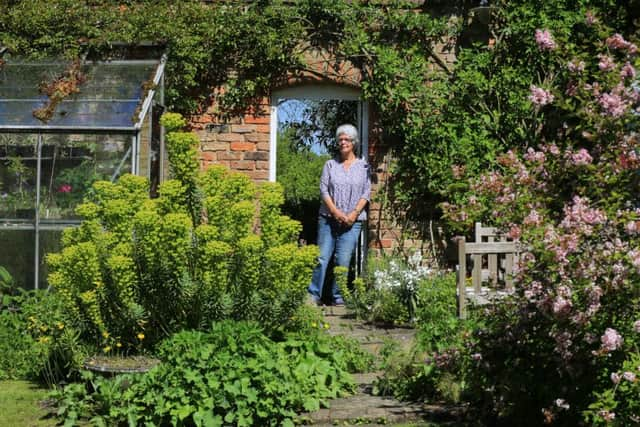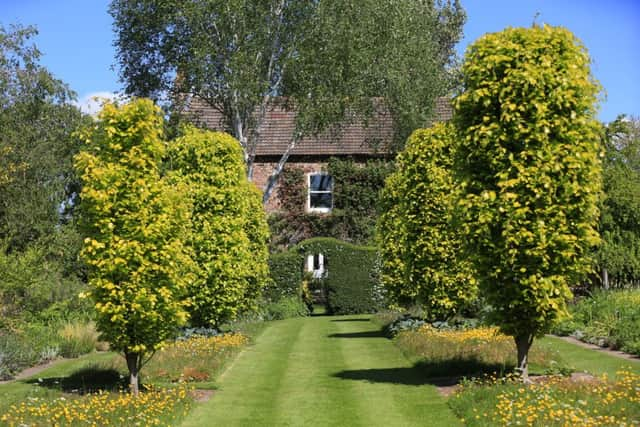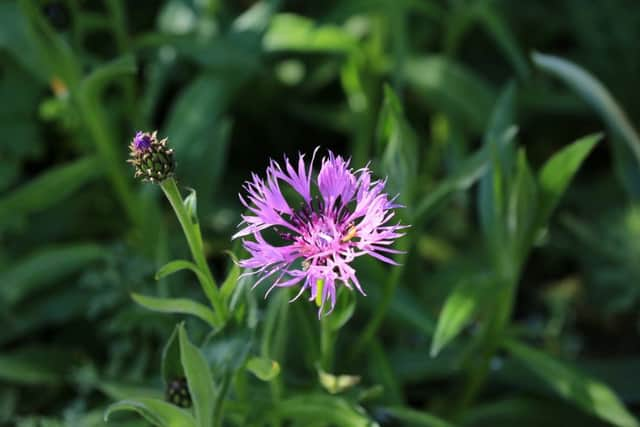Stillingfleet Lodge Gardens: The Yorkshire wildlife haven that attracts visitors from all over the world
Now rare breeds of flora flourish in a series of informal gardens where visitors are encouraged to ‘sit, look and listen’ in the four-acre haven Vanessa Cook, and husband John, have created.
“I didn’t want to create formal gardens, in fact I didn’t plan anything, they just sort of happened over the years,” says Vanessa.
Advertisement
Hide AdAdvertisement
Hide Ad“John doesn’t garden, but he is very good at doing all the odd jobs and DIY that needs doing.”


Informal gardens blend seamlessly with wildflower meadows, rare breeds planted by Vanessa rub shoulders with wild orchids which she is excited have once again decided to make home in Stillingfleet. It may look like a wild meadow but Vanessa explains that the wild grass has to be kept thin in order for the tiny, fragile orchid to grow. Stillingfleet once had the National Pulmonaria collection and Vanessa is a recognised expert grower of geraniums, a lecturer and garden writer.
A pond which looks like it has been there for centuries, was in fact an addition by Vanessa and her family a few years ago. “We lined it with clay as I didn’t want to have a plastic lining. It now looks like a natural pond although it is man-made.”
Making something look so natural takes time, and most of it is Vanessa’s labour of love, helped a couple of days a week by volunteers who tend the lawns. Stillingfleet may be open to the paying public, but it is still very much the Cooks’ home. “People do sometimes forget that,” she says. “But on the whole people are respectful of what I have tried to create here.”
Advertisement
Hide AdAdvertisement
Hide AdWhen the Cooks bought Stillingfleet Lodge 40 years ago their idea was to live the ‘good life’ living off their land and becoming as self-sufficient as possible. “It was the 70s and we had this idea that we wanted to have a cow, sheep and poultry and really try to live the good life.”


As a young woman, Vanessa had read Rachel Carson’s Silent Spring which made her want to look after nature. Widely considered the most important environmental book of the 20th century, it tells of the human poisoning of the biosphere through chemicals aimed at pest and disease control. The impact was enormous – many groups, pieces of legislation, and government agencies were inspired by it – and both its main insights remain central today. And, as far as Vanessa is concerned it has shaped her gardening for the last 40 years. “She was a woman before her time. We now, at last, seem to be starting to understand what she was saying and why. Back in the 70s I thought that was how we should live.”
So the family which by then included two children from her first marriage and two from her second, lived off the milk from their ‘house’ cow, Amy, also making cheese and yoghurt, they had pigs, poultry and grew all their own vegetables. Even today, although the animals are long gone, Vanessa and John still grow all their own vegetables. “We were pretty well self-sufficient, but there were things we had to buy like flour. It had a huge impact on the children. My children all read science at university. The eldest used to breed Long wool Leicester sheep, our local rare breed, but now looks after four children in Shropshire. My second daughter is an ecologist running a company with her husband in North Yorkshire. My son read engineering and is now an insolvency practitioner in Dublin. He was always keen on his garden and we have an apple tree he grew from a pip. My youngest daughter is an environmental auditor in Cambridge. Their children all love coming here.”
Vanessa always had a passion for horticulture and would have loved to follow this calling, but her mother decreed gardening wasn’t a career for women.
Advertisement
Hide AdAdvertisement
Hide AdShe was born in the small hamlet of Scorborough, between Beverley and Driffield in the East Riding. “My parents were both born in Yorkshire. My father owned a trawler company which closed down after the Icelandic ‘wars’ and he also farmed. I was brought up in a typical country family (the Watson Halls) surrounded by dogs, cats and horses,” recalls Vanessa, who is now in her seventies.


“Both parents liked gardening, my mother was an excellent flower arranger, she trained under Constance Spry and so she grew flowers to cut and my father loved his roses, fruit trees and bees. We grew up surrounded by plants and my two sisters have opened their gardens in the past and my brother still farms in East Yorkshire.”
But it was at school that a young Vanessa really got a taste for nature. She went to Queen Mary’s School, when it was based at Duncombe Park in Helmsley, when she was seven.
“We had an enormous amount of freedom exploring the very large grounds, it is now a private home but its grounds are open to the public. We had a wonderful ‘nature study’ teacher, every week we had to learn the names of wild flowers, picked and placed in jam jars.
Advertisement
Hide AdAdvertisement
Hide Ad“I can remember seeing lots of rare orchids which are rarer now and certainly can’t be picked. Once a year we were asked to name 100 wild flowers and I remember vividly to this day the year I got 99 because I had forgotten the name of a grass, I still have difficulty naming grasses.”
She finished her education ‘down south’ and although she took A-level botany, she started work in the labs of the haematology department at Hull hospital.
But she realised it wasn’t for her and so moved to London and trained at Tante Marie to cook and got a job cooking lunch for a firm of stockbrokers.
“I loved London – the art, the music and especially Ronnie Scott’s jazz club. I got married, moved back up to Yorkshire and made my first garden. I then divorced and worked for several years for an architect before remarrying and moving to Stillingfleet.”
Advertisement
Hide AdAdvertisement
Hide AdIt was when her fourth child was old enough to go to nursery that at last Vanessa, who was approaching 40, was able to follow her heart and enrol on a three-year horticulture course at Askham Bryan College attending one day a week.
“I absolutely loved it. I am very competitive and thrived on everything I learnt.”
She decided to open a plant nursery and then once her children had left home and most of the animals gone, she started to develop her gardens.
“It has been an evolutionary process. We started with the flower garden in 1984 and ended with the rill garden in 2008.”
Advertisement
Hide AdAdvertisement
Hide AdTrue to her ethos, she used no pesticides which has meant that insects have flourished, another attraction for expert visitors. Initially Vanessa decided to open to the public to encourage people to visit the nursery. She added a cafe in 2009 which is stacked with books about wildlife and information on the moths that are trapped and recorded in the gardens. There are also regular workshops through the spring and summer, she is part of the National Garden Scheme and an RHS partner. Everyone who visits is provided with a map and catalogue and seasonal things to look out for, there is even a child-friendly version.
As well as wanting to pass on her extensive knowledge, she still lectures on horticulture, Vanessa above all wants people to enjoy her gardens. “I love talking to other gardeners and seeing our visitors going home refreshed and enthusiastic to try things at home – I actually wish people would ask more questions.”
She is frustrated that young people are no longer encouraged to learn about nature – she organises a Wildlife Day every June to encourage families to learn more about nature.
“How can people protect wild flowers when many don’t know the difference between a wildflower and a weed? We used to have school groups come round here but then it no longer fitted into the National Curriculum. I find it upsetting that this knowledge is being lost.”
Advertisement
Hide AdAdvertisement
Hide AdStillingfleet Lodge Gardens and Nursery are open April to September every Wednesday, Friday and the first and third Saturday and Sunday of each month from 1pm to 5pm.
Entry is £5, children £1 and under 5s are free. The next Wildlife Day will be held on June 23. The day will be a celebration of British wildlife, where you can see practical demonstrations of bird ringing and moth-trapping. For more information visit www.stillingfleetlodgenurseries.co.uk.